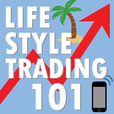
Summary: Why do we trade the S&P500 instead of individual stocks?<br> Transcript<br> On this podcast, in addition to trade recaps, we’re also going to talk about some stock market concepts —<br> <br> So you’ll learn everything from what is Elliott Wave Theory — what are options — why do we use options?<br> How do you bet where the market won’t go?<br> But for today, we’re gonna talk about why do we trade the S&P index — as opposed to individual stocks.<br> <br> People always talk about – oh, what’s the next hot stock — the next Apple — and then there are people who talk about penny stocks — and all the corrupt newsletter promotions and the pump and dump there. <br> <br> But we here avoid stocks. Why is that?<br> <br> If you look at some of the most successful traders in our recent history — take a look at Jack Schwager’s Market wizards book — you’ll know what I mean.<br> <br> Many of the traders featured in that book — trade the index or commodities — they’re not individual stock pickers for the most part. When it comes to individual stocks — that game is more about information — do you know that some biotech is gonna pass or fail some FDA approval. A lot of top funds bribe PhDs who are in the know to tip over some information — usually indirectly — so they get the hint about what’s going on. That’s a game of information.<br> <br> We don’t have access to the private, often illegal, information — and so we don’t get an edge with individual stocks.<br> <br> So that’s the first reason — we don’t have that information advantage with individual companies and stocks.<br> Stock Specific Risk<br> The second reason is that stocks exhibit a lot of different kinds of risk — in addition to overall market risk, they have stock specific risks. Every quarter, –every 3 months — a company that is listed on the stock exchange has to release quarterly earnings reports to the public. When these numbers come out — the stock and sometimes dramatically and instantly move in one way or the other — and oftentimes, the direction in which it moves can completely make no sense. A company can beat earnings, but if its guidance is down, then the stock can go down. There can be any number of possibilities — and oftentimes, having an information advantage doesn’t necessarily guarantee results.<br> <br> So this kind of stock-specific risk is too unpredictable — that we don’t wan to play that game.<br> <br> Remember, it’s almost like walking into a casino — there’s all kinds of games that are available to play. You can play kraps, blackjack, poker, –and then within each, there’s different tables — you get to pick which game to play. Picking stocks is not the game we want to play. One minute a company can get FDA approval, the next minute, there can be a reversal of that decision. Not for us.<br> <br> Now what about the index? Well, you see the index is essentially an average of all the major stocks — a true representation of the overall market. And so while individual stocks could go up or down 30 or 40% in one day — it’s extremely rare for the entire index to be down 10% or even 5% in one day.<br> <br> Now, you might be wondering —well, if the index barely fluctuates and moves in less than 1 percent typically on any given day — wouldn’t it be really hard to make any money because there isn’t much movement compared to stocks?<br> <br> Well, to that I would tell you that with the S&P — you got things like options and futures — that not only give you leverage so you that 1% move can be magnified many times.
